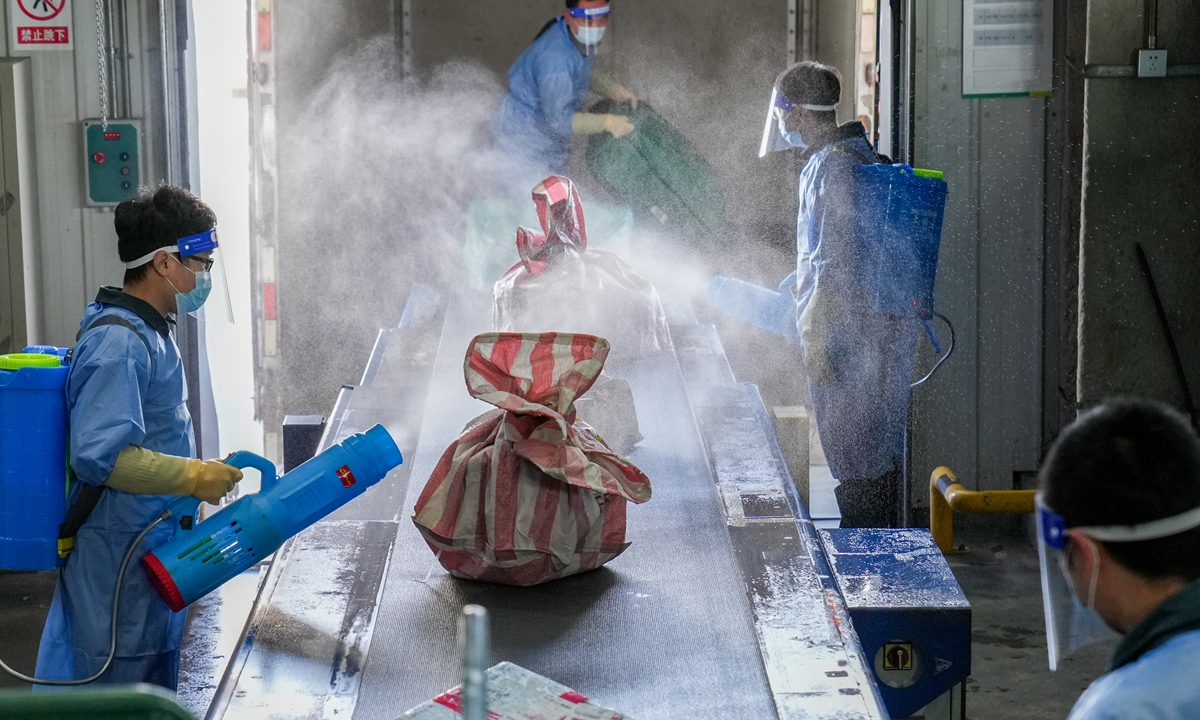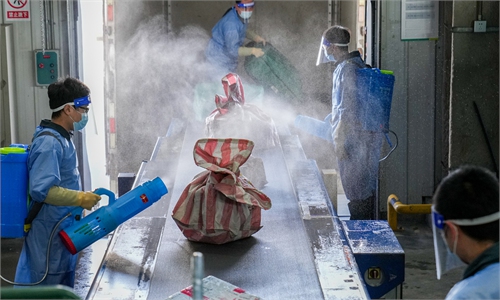
Staffers conduct disinfection on packages arrving from outside the country in the terminal site of Beijing Air Mail Processing Center on November 19, 2021. Photo: CFP
People who receive mails from overseas should take nucleic acid tests between the third and seventh day after receiving it, several cities in South China's Guangdong Province issued the notice recently as a normalized anti-epidemic measure to prevent international packages from causing domestic COVID-19 flare-ups.
The measures came after international goods and mails were suspected to be a source of infection in COVID-19 patients in three cities of China - Beijing, Zhuhai and Shenzhen.
The recipients needn't pay the testing fee. In Guangzhou, either the local center of epidemic prevention and control will send text alerts to international mail receivers to remind them to take test or international mail receivers could take free tests by showing their mail receipts.
Several other cities in the province including Shanwei and Zhaoqing issued a similar notice to encourage people to have themselves tested if they had received mail from overseas.
Yang Zhanqiu, a virologist based in Wuhan, told the Global Times that, in face of anti-epidemic pressure of Spring Festival and Winter Olympics, it is understandable for Guangdong as a port which receives large amounts of mail from overseas to adopt such measures to prevent the risk of international mails from spreading the virus to humans.
The virus tends to live longer in low temperature. Testing between the third and seventh day after receiving the international mail is necessary to detect if the person in close contact with it is infected with the virus or not, Yang said.
Meanwhile, the Guangdong postal administration beefed up disinfections on packages from overseas. The goods should be disinfected twice at the first stop in the destination city after customs clearance. The collection bag of international mails should be disinfected on six sides and then left still for 24 hours before disassembling the mails and disinfecting them.
The virologist also said the measure of testing all international mail receivers shouldn't be adopted nationwide because the anti-epidemic efforts should still be placed on early detection on people in port cities working in processing the mails, or cold-chain food or goods from overseas.
But people who receive the mail should stay alert over taking precautionary measures when opening the mail, and possible symptoms of COVID-19 in case of being infected, especially when the rampant overseas epidemic increases the possibilities of goods or mails carrying virus, experts said.
Meanwhile, in an anti-pandemic technical guideline released by the Beijing Center for Disease Prevention and Control (Beijing CDC), the agency advised people to disinfect the mails' external packaging and the mail per se, and to have a voluntary test if they have a fever or cough within 14 days after touching international packages. People are also advised to open overseas packages outside their homes with masks and gloves on, the agency said.
South China's Hainan Province suggested people not to purchase goods from countries and regions where the epidemic is rampant.
At least two Omicron cases, one in Beijing and another in Shenzhen, were suspected of being infected by packages from North America. One COVID-19 patient in Zhuhai also had frequent contact with goods from overseas.


